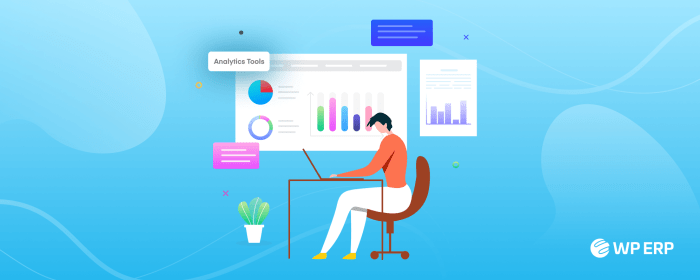CRM software with analytics is revolutionizing how businesses understand and engage with their customers. By merging customer relationship management tools with powerful analytics, organizations can unlock insights that lead to better decision-making and improved customer experiences. This integration not only enhances the ability to track customer interactions but also provides valuable data that drives strategic initiatives and fosters growth.
As companies continue to navigate an increasingly competitive landscape, the role of analytics within CRM systems becomes even more critical. It empowers businesses to analyze customer behavior, predict trends, and tailor their services accordingly, ensuring they meet and exceed customer expectations. Understanding how best to leverage these tools can set a company apart from its competitors and lead to sustained success.
Importance of CRM Software with Analytics
Integrating analytics into CRM software is crucial for modern businesses aiming to harness data effectively. The significance lies in its ability to transform raw data into actionable insights, enabling organizations to understand their customers better and tailor their services accordingly. This integration fosters a more strategic approach to customer relationship management, ultimately enhancing customer satisfaction and loyalty.
Analytics profoundly impacts customer relationship management by providing detailed insights into customer behavior, preferences, and trends. With these insights, businesses can identify patterns, optimize marketing strategies, and improve customer engagement. CRM analytics enhance decision-making processes by equipping teams with evidence-based data that supports strategic planning and forecasting.
Key Features of CRM Software with Analytics

Essential features that CRM software should offer in terms of analytics include dashboard customization, predictive analytics, and data visualization tools. These capabilities allow businesses to monitor key performance indicators (KPIs) in real-time and make data-driven decisions.
Real-time data tracking is a significant benefit for businesses, as it enables immediate responses to market changes and customer needs. This not only enhances customer service but also streamlines operations and increases efficiency.
| Feature | Description | Benefits |
|---|---|---|
| Dashboard Customization | Personalized views for different users. | Improves user engagement and focus. |
| Predictive Analytics | Forecasting future trends based on historical data. | Helps in strategic planning and resource allocation. |
| Data Visualization Tools | Graphical representations of data for easy understanding. | Aids in quick analysis and reporting. |
Benefits of Using CRM Software with Analytics
Utilizing analytics in CRM provides extensive advantages, particularly in generating improved customer insights. Companies can analyze customer interactions and feedback, leading to better product development and service enhancement.
Analytics play a critical role in forecasting sales trends, allowing businesses to prepare and adapt their strategies proactively. By understanding purchasing behaviors and market dynamics, organizations can optimize inventory and marketing efforts.
The top benefits of CRM software with robust analytics functions include:
- Enhanced customer segmentation for targeted marketing.
- Increased sales through better understanding of customer needs.
- Improved customer retention by predicting churn.
- Optimized resource allocation based on performance metrics.
- Streamlined operations through data-driven decision-making.
Choosing the Right CRM Software with Analytics

Selecting the best CRM software that includes analytics requires careful consideration of several criteria. Businesses should evaluate the scalability, user-friendliness, and integration capabilities of the software.
A comparison of different CRM solutions based on their analytical functionalities is essential. Factors to assess include the depth of analytics offered, customization options, and the ability to generate actionable insights from data.
Evaluating CRM software fit for specific business needs involves a thorough exploration of features and capabilities. Organizations should consider conducting trials or demos to ensure the software aligns with their operational requirements.
Implementation of CRM Software with Analytics
Implementing CRM software with analytics entails a systematic approach that includes several key steps. Businesses should start by defining their goals and objectives for using the software, followed by selecting the appropriate CRM solution.
A flowchart illustrating the implementation process should cover the roles involved, such as project managers, IT specialists, and end-users, ensuring clarity throughout the integration phase.
Common challenges faced during implementation can include resistance to change and data migration issues. Overcoming these obstacles often requires clear communication, adequate training, and a phased implementation strategy to ease transition.
Case Studies of Successful CRM Software with Analytics Usage

Real-world examples of businesses effectively using CRM software with analytics highlight the transformative power of data-driven decision-making. Companies have experienced significant improvements in customer satisfaction metrics following the integration of analytics into their CRM practices.
Key metrics that demonstrated success in these case studies include increased sales revenue, improved customer retention rates, and enhanced operational efficiency. These businesses serve as benchmarks for others seeking to optimize their CRM strategies.
Lessons learned from these successful implementations emphasize the importance of continuous training and adaptation to emerging analytics trends. Organizations that prioritize these elements can maintain a competitive edge in their industries.
Future Trends in CRM Software with Analytics
Emerging trends are shaping the future of CRM software analytics, with advancements in AI and machine learning at the forefront. These technologies are set to revolutionize how data is analyzed and utilized, providing deeper insights and more accurate predictions.
Predictions suggest that AI-driven analytics will enable businesses to automate routine tasks, allowing teams to focus on strategic initiatives. Companies adopting these technologies will likely see enhanced efficiency and effectiveness in their CRM processes.
| Current Trend | Potential Impact on CRM Practices |
|---|---|
| AI Integration | Automating data analysis and customer interactions. |
| Predictive Analytics | Enhancing sales forecasting and customer targeting. |
| Personalization | Delivering tailored customer experiences in real time. |
Last Point: CRM Software With Analytics
In summary, the integration of analytics into CRM software presents numerous advantages that can transform customer relationship management practices. By embracing these technologies, businesses not only gain deeper insights into customer preferences but also enhance their ability to forecast future trends and make informed decisions. As the landscape of CRM continues to evolve, staying ahead of emerging trends will be key to harnessing the full potential of CRM software with analytics.
